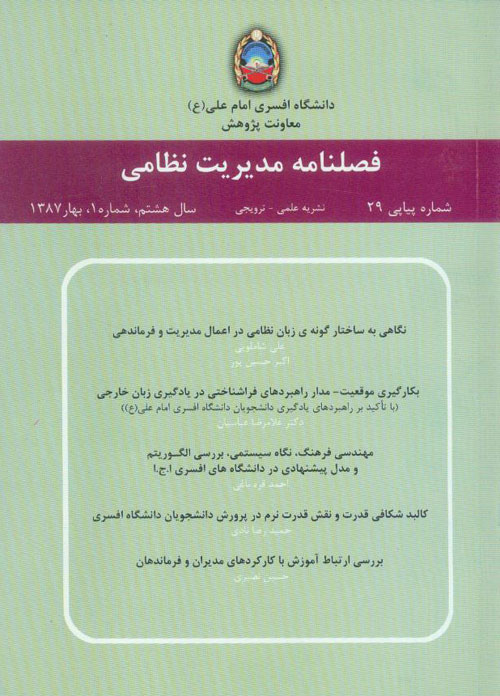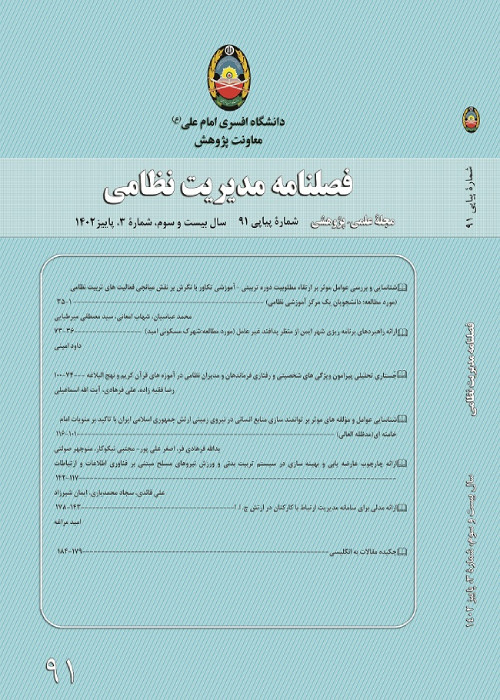فهرست مطالب

فصلنامه مدیریت نظامی
پیاپی 29 (بهار 1387)
- تاریخ انتشار: 1387/03/03
- تعداد عناوین: 5
-
Page 1"Knowing the Forms" as one of the major sub categories of linguistics intends to categorize and identify different types of language on the basis of functions and structures of the language. Among different language Military language involves special structure in written and spoken from. In line with management and commandership in military units and setting and editing the official writing, thet's essential to survey and analyze the military language. In this essay we try to analyze and identify the structure of the Military type.Keywords: Type, Linguistics, Military language, Structure, Term
-
Page 14This article aims to explore a context-bound and methodologicallyoriented metacognitive strategy use (MSU). To this end, two major questions were raised. The study was carried out in the Iranian educational context conventionally categorized into three settings of: authoritarian, semi-democratic and democratic, due to the varying existing educational policies and planning. The participants (N=180), homogenized based of their scores on TOEFL, answered the Metacognitive Strategy Questionnaire by Item Type (MSQIT) (Purpura, 1999) version of the Strategy Inventory of Language Learning (SILL) and Good Language Learner's Questionnaire (GLLQ), and did two language tasks accompanied with a videotaped think-aloud protocol on MSU. Both qualitative and quantitative analyses were run. The findings revealed unexpected results in a sense that some underlying aspects attributed to MSU were explored which confirmed the fact that conventional quantitative statistical analysis relying on just statistical significance cannot be convincing enough to explore the construct of cognitive phenomena. This study not only showed some statistical significance of MSU in relation to educational setting type but also the qualitative approach led to the exploration of certain substrategies and cognitive processing unprecedented in the related literature. The findings also showed that certain subcategories of metacognitive strategies (MS) are more context-bound than the others, confirming the effects of educational setting type on both quantity and quality of MSU. The implications of the study are of both theoretical and practical in nature on: (1) the nature of MS, (2) research methods, (3) curriculum development, (4) classroom management, and (5) individualized instructions. Furthermore, the findings cast light on language curriculum development in general and in military settings in particular.Keywords: Metacognitive Strategies, Educational Setting, Qualitative, Quantitative Research
-
Page 40As a general rule, man behaves highly complex in a sense that never can we expect predictable responses from him on the basis of the stimulus he receives through common channels. We are not well aware of the mechanism of his performance. This paper is an attempt to offer a relatively explanatory answer to such complexities. To this end, first the notion of culture is defined, and then its components are discussed. Discussions on the origin of culture, culture engineering and systemic modeling mechanism of the formation of culture will also be given due attention. Furthermore, the term “Cultural Engineering” is defined for the purpose of the study and its origin in the army universities of Iran in terms of required management and planning will be discussed. While explaining the mechanism and process of the formation of culture, an algorithm for the cultural engineering operation in this context is offered. In the end, an instrument is devised for schematic representation of the process of the mentioned strategy as well as criteria for the evaluation of culture identified as strategic star will be developed and offered.Keywords: Cultural Engineering, Armament Culture, Army Universities
-
Page 70Exercising force is carried out to make others remain obedient. Soft power also follows the same objective implicitly. That is why an identification of means and resources from which power is derived could play a major part for authorities to exercise their power for the purpose of achieving the target obedience. Iranian Army Universities as the centre for educating prospective commanders for the Army needs obedient, disciplined and committed officers. To this end, an analysis of power and its dimensions can be of great significance in making the performance of the commander much more purposeful and meaningful. The crucial question to be addressed in this study is which of the means and resources of power is much more effective in internalizing obedience among the cadets. While explaining the role of conditional power as the most effective power source, attempts are made in this study to offer an approach for the purpose of utilizing soft power as to educating the cadets.Keywords: power, obedience, education
-
Page 82Training and various in-service scientific and military cources affered for military leaders and commanders play a significance part in the accomplishments of their respective units. The claim is justified on the grounds that they are affected positively so that they can take the best advantages of available material and human resources, planning, organizing, motivation, human relations, leadership and control are some of the outcomes of training courses which are highly influentional in improving their functions and increasing decision-making competence. To this end, the present study attempts to explore the nature of such a relationship.Keywords: Training, Performance, Leaders, Commanders, Management


